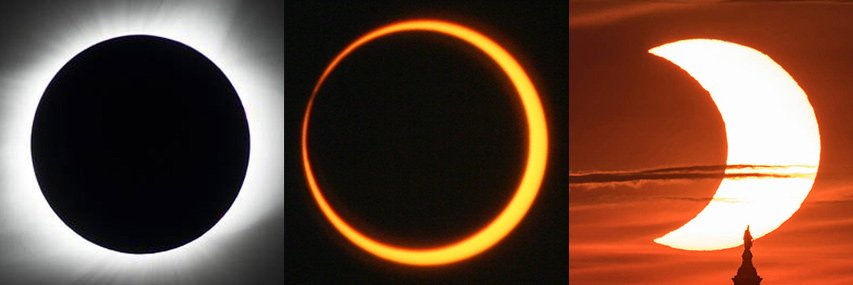Solar Eclipses & Eye Safety
Introduction
The universe is a vast stage, with events that captivate our imagination and remind us of our place in the cosmos. One such event that has fascinated humans for centuries is the solar eclipse. This rare and awe-inspiring phenomenon occurs when the moon passes between the Earth and the Sun, casting a shadow on our planet. While solar eclipses are magnificent to witness, they also present a critical need for eye safety. In this blog post, we'll delve into what is a solar eclipses and discuss the importance of protecting your eyes during these extraordinary celestial displays.
Upcoming Eclipses
Two remarkable solar eclipses are set to occur in Canada. On October 14, 2023, most of Southern Canada will witness a partial solar eclipse, followed by a total eclipse on April 8, 2024, spanning from Southern Ontario to Newfoundland and Labrador, with the rest of Canada experiencing a partial eclipse. While these events are awe-inspiring, they also pose potential risks to eyesight if proper precautions are not taken.
Background & Understanding Solar Eclipses
A solar eclipse occurs when the moon, in its elliptical orbit, aligns perfectly with the Earth and the Sun. This alignment can result in one of three types of solar eclipses:
Total Solar Eclipse: In a total solar eclipse, the moon completely covers the Sun, casting a shadow on the Earth. This is a rare event and the most visually striking, with the sky darkening to twilight and the Sun's corona becoming visible. Spanning Southern Ontario to Newfoundland happening April 8, 2024
Annular Solar Eclipse: An annular eclipse occurs when the moon covers the center of the Sun, leaving a "ring of fire" effect around its edges. This happens when the moon is near its apogee, the farthest point from Earth in its orbit.
Partial Solar Eclipse: During a partial solar eclipse, only a portion of the Sun is covered by the moon. The extent of the coverage varies depending on one's location. Spanning most of Southern Canada happening October 14th, 2023
The Importance of Eye Safety
While solar eclipses are extraordinary events to witness, it is crucial to prioritize eye safety when observing them. Staring directly at the Sun, even during an eclipse, can cause permanent eye damage. The Sun's intense light can burn the retinas in your eyes, leading to solar retinopathy, a condition that may result in blindness. The danger of solar eclipses lies in the fact that even during a partial eclipse, the Sun's intense radiation still gets through.
Here are some essential tips for safeguarding your eyes during a solar eclipse:
Use Specially Designed Solar Viewing Glasses or Filters: The most reliable way to observe a solar eclipse is through solar viewing glasses specifically designed for this purpose. These glasses have special filters that block harmful solar radiation. These filters should comply with the ISO 12312-2 safety standard, blocking out harmful ultraviolet (UV) and infrared (IR) radiation, as well as intense visible light. We advise you to obtain filters from reputable sources to ensure authenticity and to inspect them for any damage before use.
Solar Filters for Telescopes and Cameras: If you're using telescopes, binoculars, or cameras to capture the eclipse, make sure to use solar filters to protect your equipment and your eyes.
Pinhole Projection: An alternative method for safe eclipse viewing is through a pinhole projector. Create a small hole in a piece of cardboard and project the Sun's image onto a screen or another piece of cardboard. This indirect method allows you to witness the eclipse safely.
Watch Online or on Television: If you are unable to obtain proper eclipse viewing equipment or are in an area where the eclipse is not visible, consider watching live broadcasts or webcasts of the event.
We discourage the use of homemade filters like sunglasses, unfiltered cameras, CDs, or exposed film, as these do not provide sufficient protection against solar radiation.
It’s import to put on the eclipse glasses/filters before looking up at the Sun and keeping them on while viewing. Even a brief look at the partly eclipsed Sun can result in harm to the eyes.
Children may need extra supervision during eclipses as they may not fully comprehend the risks involved, so parents should educate them about eye safety and provide proper filters or alternative safe viewing methods.
Conclusion
Solar eclipses are natural wonders that inspire awe and wonder in all who witness them. However, it's important to remember that our eyes are irreplaceable, and the damage caused by looking at the Sun during an eclipse is irreversible. Prioritizing eye safety by using solar viewing glasses, filters, or indirect viewing methods ensures that you can enjoy the celestial spectacle without putting your vision at risk.
As you prepare for the next solar eclipse, remember that by taking the necessary precautions, you can witness this breathtaking cosmic event safely and protect the precious gift of sight that allows you to enjoy the wonders of our world and the cosmos beyond.
CAO Eclipse Resources
CAO Eye Health Library Solar Eclipse Safety piece with viewing safety tips: https://opto.ca/eye-health-library/solar-eclipse-safety
Optical Prism Article Aug 2023: Solar Eclipse Alert: What ECPs need to know to protect their patients - Dr. B Ralph Chou
Optical Prism Article Sept 2023: Playing Hide & Seek with the Sun: Eclipse Dos and Don’ts – Dr. Martin Spiro
Eclipse infographic: https://www.dropbox.com/scl/fi/773ejbfd59giswxxe0ka9/Eclipse-InfographicEN.pdf?rlkey=bs8lelv9mshq1ix61ucfaknw2&dl=0 • Eclipse Q&A videos: https://www.youtube.com/watch?v=L1wREtqPwiQ&list=PLq1LS2dAALDuJzfbKjJWJS9J a1QXjeUu8
Eclipse Social Media Guide: https://www.dropbox.com/scl/fi/8y22z7zkkzwq17nkbuoa1/CAO-Eclipse-SocialGuide.pdf?rlkey=7st2tp9y2f4yb2polbw9qlg73&dl=0
Eclipse Social Media Content: https://www.dropbox.com/scl/fo/dgg0e4w2xyyywvp5mqt4l/h?rlkey=eu0fm7ppzgix6j x8tveowpa5u&dl=0
Other Eclipse Resources
Eclipse path: The American Astronomical Society and eclipse2024.org websites have detailed information on the eclipses, including the timing and path across North America
Eclipse viewers/glasses: The American Astronomical Society: https://eclipse.aas.org/resources/solar-filters and the Eclipse2024 website: https://eclipse2024.org/glasses_order.html have information and links for ordering solar eclipse glasses.
Watch online: https://www.exploratorium.edu/eclipse/livestream
Eclipse app: https://www.exploratorium.edu/eclipse/total-solar-eclipse-app
Pinhole camera instructions: https://www.jpl.nasa.gov/edu/learn/project/how-tomake-a-pinhole-camera/
2024 Eclipse
Article on 2024 eclipse viewing in Canada: https://theconversation.com/on-april8-2024-parts-of-ontario-quebec-the-maritimes-and-newfoundland-will-see-a-totaleclipse-of-the-sun-heres-how-to-get-ready-for-it-203382


